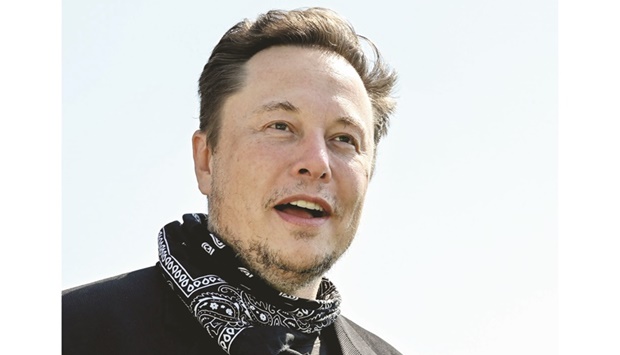Elon Musk tweeted yesterday that his $44bn cash deal for Twitter Inc was “temporarily on hold” while he waits for the social media company to provide data on the proportion of its fake accounts.
Twitter shares initially fell more than 20% in premarket trading, but after Musk, the chief executive of electric car market Tesla Inc, sent a second tweet saying he remained committed to the deal, they regained some ground.
The shares were down 10% to $40.50 in morning trading yesterday, a steep discount to the $54.20 per share acquisition price.
Musk, the world’s richest person, decided to waive due diligence when he agreed to buy Twitter on April 25, in an effort to get the San Francisco-based company to accept his “best and final offer.” This could make it harder for him to argue that Twitter somehow misled him.
Since then, technology stocks have plunged amid investor concerns over inflation and a potential economic slowdown.
The spread between the offer price and the value of Twitter shares had widened in recent days, implying less than a 50% chance of completion, as investors speculated that the downturn would prompt Musk to walk or seek a lower price.
“Twitter deal temporarily on hold pending details supporting calculation that spam/fake accounts do indeed represent less than 5% of users,” Musk told his more than 92mn Twitter followers.
Twitter is planning no immediate action as a result of Musk’s comment, people familiar with the matter said. The company considered the comment disparaging and a violation of the terms of their deal contract, but was encouraged by Musk subsequently tweeting he was committing to the acquisition, the sources added. There was no immediate reaction from the investors that Musk tapped last week to raise $7.1bn in funding.
Spam or fake accounts are designed to manipulate or artificially boost activity on services like Twitter. Some create an impression that something or someone is more popular.
Musk tweeted a Reuters story from ten days ago that cited the fake account figures. Twitter has said that the figures were an estimate and that the actual number may be higher. The estimated number of spam accounts on the microblogging site has held steady below 5% since 2013, according to regulatory filings from Twitter, prompting some analysts to question why Musk was raising it now. “This 5% metric has been out for some time. He clearly would have already seen it... So it may well be more part of the strategy to lower the price,” said Susannah Streeter, an analyst at Hargreaves Lansdown.
Representatives for Musk did not immediately respond to requests for comment from Reuters. Tesla’s stock rose 4% on Friday morning. The shares have lost about a quarter of their value since Musk disclosed a stake in Twitter of April 4, amid concerns he will get distracted as Tesla’s chief executive and that he may have to sell more Tesla shares to fund the deal.
There is plenty of precedent for a potential renegotiation of the price following a market downturn. Several companies repriced agreed acquisitions when the Covid-19 pandemic broke out in 2020 and delivered a global economic shock.
In one instance, French retailer LVMH threatened to walk away from a deal with Tiffany & Co. The US jewellery retailer agreed to lower the price by $425mn to $15.8bn.
Acquirers seeking a get out sometimes turn to “material adverse effect” clauses in their merger agreement, arguing the target company has been significantly damaged. But the language in the Twitter deal agreement, as in many recent mergers, does not allow Musk to walk away because of a deteriorating business environment, such as a drop in demand for advertising or because Twitter’s shares have plunged.
Musk is contractually obligated to pay Twitter a $1bn break-up fee if he does not complete the deal, and the language in the deal contract appears to cap any damages that Twitter can seek from Musk to that level.
But the contract also contains a “specific performance” clause that a judge can cite to force Musk to complete the deal.
In practice, acquirers who lose a specific performance case are almost never forced to complete an acquisition and typically negotiate a monetary settlement with their targets.
“The nature of Musk creating so much uncertainty in a tweet (and not a filing) is very troubling to us and the Street and now sends this whole deal into a circus show with many questions and no concrete answers as to the path of this deal going forward,” Wedbush analyst Daniel Ives wrote in a note.
Musk has said that if he buys Twitter he “will defeat the spam bots or die trying” and has blamed the company’s reliance on advertising for why it has let spam bots proliferate.

Elon Musk
